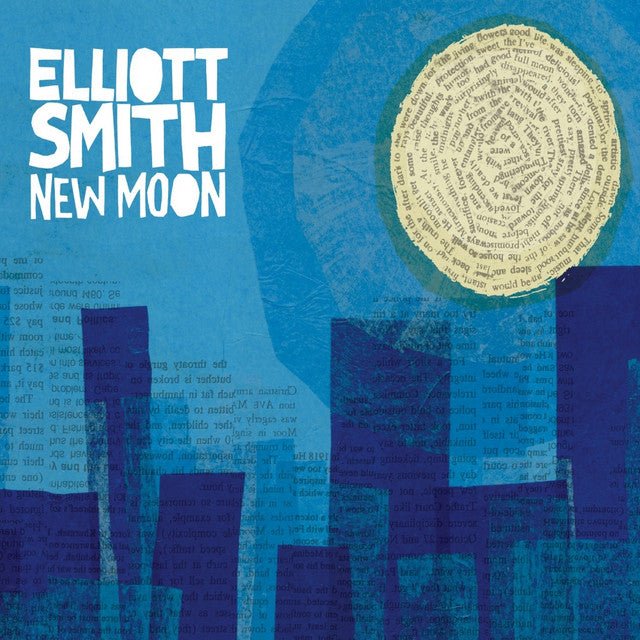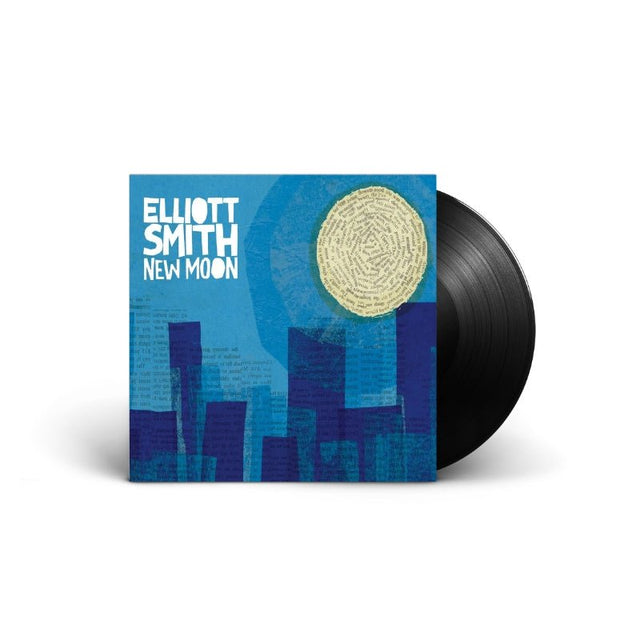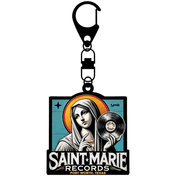Elliott Smith - New Moon
View all products by: Elliott Smith
PRODUCT & AVAILABILITY
Format: Vinyl
Condition: New
Available in store: ✔
Available for shipping: ✔
Elliott Smith - New Moon is backordered and will ship as soon as it is back in stock.
Couldn't load pickup availability
Description
"I kept recording more songs with no regard whether or not they were gonna be on anything. That's what I'm used to doing, recording all the time and not going, 'What should I record for this record?' Usually I put out whatever happened in the last six months. With this, I had way too many songs and no mechanism for picking between them."Elliott Smith, Tape Op Magazine, 1996, on finishing Either/OrArguably the most gifted song-writer of his generation, Elliott Smith produced a large body of work that includes five solo albums, as well as From a Basement on the Hill (2004), a collection of songs completed before his death in 2003. On May 8, 2007, Kill Rock Stars will release a double CD of music by Elliott Smith entitled New Moon. The album contains 24 songs recorded between 1994-1997, a prolific time in Smith's career, when he recorded his self-titled album and Either/Or (both also released by Kill Rock Stars). Like his other work, New Moon reflects the power of Smith's ability to integrate rich, melodic music with poetic, multi-layered lyrics. Only three songs have seen prior release all on compilations most extremely limited runs. The final mixing for New Moon was done by Larry Crane, who is also the archivist for the estate of Elliott Smith. A significant portion of proceeds from the album sales will go directly to Outside In, a Portland-based social service organization dedicated to providing diverse services for homeless youth and low-income adults. Review Elliott Smith's legacy is best spoken by his records. For all the emphasis placed on his unhappy backstory and the distressing nature of his death, Smith left behind a body of work that defies and exceeds any stereotyping. Sadness may be the easiest emotional current to pick up on in his songs, but Smith's expressive range was as wide as it was subtle; his music could be angry, funny, hopeful, and despondent, often at the same time. New Moon collects two CDs worth of material recorded around the same time as 1995's Elliott Smith and its 1997 follow-up Either/Or, and unlike typical posthumous releases (not to mention second ones), is a genuinely worthy addition to a stunningly consistent catalog. Part of what makes both Either/Or and 1998's XO so essential is Smith's avoidance of classic album compartmentalization; you don't get the sad song, followed by the experimental song, followed by the upbeat song. Smith didn't record specifically towards any album, he just recorded-- more or less constantly. At their inception, the songs compiled for New Moon were no less significant than those that wound up making the cut for Elliott Smith and Either/Or, and for the most part they re no less developed. Smith s signature style is more musical than it is aesthetic; from the lo-fi folk of Roman Candle through the muscular chamber-pop of Figure 8, Smith's songwriting tics remain completely recognizable. New Moon is overflowing with characteristic melodic turns and unexpected chord changes, yet still covers a good deal of ground stylistically. The chugging acoustic guitar of Big Decision conjures Johnny Cash, while New Monkey subtly nods to a similarly titled Beatles song. Each song seems fully realized in its own right; for a 2xCD posthumous compilation, it s unbelievably refreshing to not pick up even the slightest whiff of exploitative barrel-scraping. Like much of Smith's material from this era, New Moon is by and large quiet, acoustic, and emotionally complicated. It s easy to see why Smith's music earned him a reputation as a sad sack, but such dismissals don't really hold up to any scrutiny. When asked whether he considered himself a lo-fi artist, Smith once responded that he simply didn t want the recording process to be a drag. Smith s interest in the the expressive potential of recording comes through loud and clear on New Moon; even when the subject or tone of a song is depressing, it still carries an unmistakable note of joy... Phrases like rare talent are thrown around all the time these days, but this compilation makes painfully clear just how unique and valuable this music is. Smith's visionary qualities were not terribly flashy or transgressive, and his great musical gifts were not those of innovation. Instead, he steadily and quietly wrote, honed, and recorded a body of beautifully executed, deeply moving records not quite like any others. Consider him the patron saint of hobbyists, a talented and dedicated craftsman with a tireless love of the creative process. --Pitchfork With most recording artists, the unveiling of an album made up of tracks rejected from other discs wouldn't be a particularly big deal just another odds-and-sods record relevant to the devotee, but entirely dismissible by the casual fan. When it comes to Elliott Smith, though, things are different: There are no casual Smith fans. They're pretty much all fanatics, acolytes who've invested the lo-fi icon with the kind of awe reserved for The Beatles at the height of their creative powers. And just as Beatles fans had their revelatory Anthology, Smith fans will have New Moon. Produced by Smith's old friend and sometime engineer Larry Crane, the package collects two discs' worth of demos, album outtakes, and out-of-print material recorded between 1994 and 1997, a period rightfully considered Smith's golden age. Spanning the recording of his chilling self-titled album and his melodic manifesto Either/Or, the tracks chronicle not just the most productive period in his life, but arguably the most disturbing years marked by a nervous breakdown, a suicide attempt, and a terrifying stay in a psychiatric hospital. While the underlying issues were certainly addressed in the contemporary releases, it's remarkable to hear the evidence of Smith's psychological deficiencies in the quality of New Moon's songs throwaways to him the least of which would have made a lesser artist beatific with pride. A handful of unexpected Smith classics emerge in ''High Times,'' ''Placeholder,'' ''Fear City,'' ''Going Nowhere,'' and ''Georgia, Georgia'' whose ''what a plan, suicide'' lyric should stir endless discussion about Smith's eventual demise. With its steeplechase guitar work and venomous vocal, ''Almost Over'' is as arresting a tune as Smith ever wrote. And the alternate versions of familiar material such as a lovely acoustic take on ''Miss Misery'' are all welcome inclusions... --The Onion A.V. Club ...So what a lovely surprise it was to hear New Moon for the first time and be immediately wowed by the power and elegance of the material. There is nothing tentative or unpolished about any of these songs. Produced as part of the sessions for his self-titled second album and Either/Or, his third, most would have fit pretty well on both. Included is a haunting, perhaps overly deferential cover of Big Star's ''Thirteen,'' which Smith regularly played in his live shows, and an uncharacteristically up-tempo tune called ''New Monkey'' that caustically mocks indie scenesters and suggests he didn t much appreciate being pigeonholed as a junkie just because he walked around in a state of self-absorption. On ''Georgia, Georgia,'' the sentiments get significantly darker when he remarks, ''Oh man, what a plan, suicide.'' One of the little things you hear over and over on New Moon is the slither of Smith's fingers brushing against the guitar strings as he changes chord positions. Imperfections like this are often fetishized by producers eager to lend authenticity to singer-songwriters who don't automatically convey it, but in Smith's case, they weren't an affectation. He recorded his music extremely closely it sometimes sounds as if he s swallowing the microphone which allowed him to sing and play guitar quite softly. This is not a novel technique; Bruce Springsteen does it a fair amount on his quieter material. But Smith made it the defining feature of his sound. And what that does, combined with the informal, conversational ease of lyrics is lend his music a sense not only of intimacy but of empathy. Which saves his music from being merely maudlin. Well, that and his knack for writing melodies that merit the cliché of being compared to the Beatles. Smith's fans will enjoy New Moon for the new trove of loving sonic details it offers up, its piercing lyrical moments, and for the little mysteries it presents (like why did Smith leave the song ''Either/Or'' included here, off the album to which it gave its name?). The greatest reward of the album, though, is that for those who like to immerse themselves in his music when the mood strikes, like, you know, when your girlfriend dumps you and you feel like giving your life over to drugs, it substantially deepens the pool of good wallowing material. ...New Moon gives him the triumphant comeback he never had in life, and it comes out at an appropriate moment, when many indie-rock artists of his era, like Dinosaur Jr., are reforming and trying to recapture their old sound. From beyond the grave, Elliott Smith shines bright. --New York MagazineSide A:
| 1 | Angel in the Snow |
| 2 | Talking to Mary |
| 3 | High Times |
| 4 | New Monkey |
| 5 | Looking Over My Shoulder |
| 6 | Going Nowhere |
| 7 | Riot Coming |
| 8 | All Cleaned Out |
| 9 | First Timer |
| 10 | Go By |
| 11 | Miss Misery [Early Version] |
| 12 | Thirteen |
Side B:
| 1 | Georgia, Georgia |
| 2 | Whatever [Folk Song in C] |
| 3 | Big Decision |
| 4 | Placeholder |
| 5 | New Disaster |
| 6 | Seen How Things Are Hard |
| 7 | Fear City |
| 8 | Either/Or |
| 9 | Pretty Mary K [Other Version] |
| 10 | Almost Over |
| 11 | See You Later |
| 12 | Half Right |
Join the movement!
Get Front Row Access to Deals, Discounts, and New Music!
Delivery and Shipping
Delivery and Shipping
Enjoy fast, free shipping on all U.S. orders over $50! We use Mighty Music Mailer shipping boxes to ensure safe arrival of your records. Returns accepted within 30 days.* Shop with confidence at Saint Marie Records!"
*Items must be returned in their original condition as shipped.
Care Information
Care Information
Record Care Tips:
- Handle records by the edges to prevent fingerprints and smudges.
- Store records upright in a cool, dry place away from direct sunlight.
- Use a soft, anti-static cloth to clean records before and after each play.
- Avoid stacking records to prevent warping.
CD Care Tips:
- Always handle CDs by the center hole and outer edges to avoid scratches.
- Store CDs in their original cases to prevent dust and damage.
- Clean CDs with a soft, lint-free cloth by wiping straight from the center outwards.
- Keep CDs away from extreme heat and direct sunlight to prevent warping.
Clothing Care Tips:
- Wash clothing inside out with cold water to preserve print and fabric quality.
- Use a gentle cycle and avoid harsh detergents or bleach.
- Air-dry clothing or tumble dry on low to prevent shrinkage and damage to printed designs.
- Iron clothing inside out on a low setting if necessary, avoiding direct contact with printed areas.
Description
Description
Side A:
| 1 | Angel in the Snow |
| 2 | Talking to Mary |
| 3 | High Times |
| 4 | New Monkey |
| 5 | Looking Over My Shoulder |
| 6 | Going Nowhere |
| 7 | Riot Coming |
| 8 | All Cleaned Out |
| 9 | First Timer |
| 10 | Go By |
| 11 | Miss Misery [Early Version] |
| 12 | Thirteen |
Side B:
| 1 | Georgia, Georgia |
| 2 | Whatever [Folk Song in C] |
| 3 | Big Decision |
| 4 | Placeholder |
| 5 | New Disaster |
| 6 | Seen How Things Are Hard |
| 7 | Fear City |
| 8 | Either/Or |
| 9 | Pretty Mary K [Other Version] |
| 10 | Almost Over |
| 11 | See You Later |
| 12 | Half Right |
Payment & Security
Payment methods
Your payment information is processed securely. We do not store credit card details nor have access to your credit card information.




